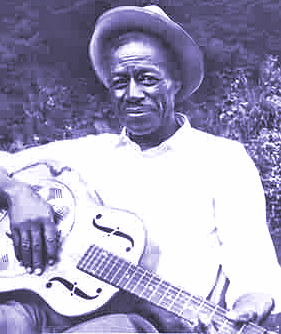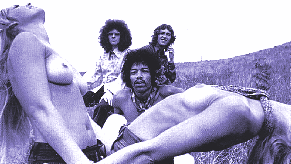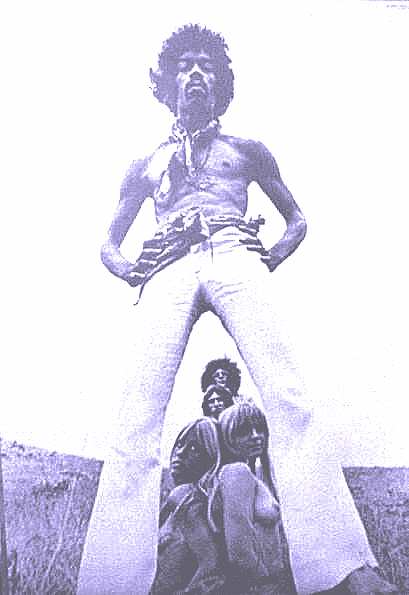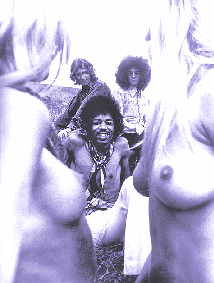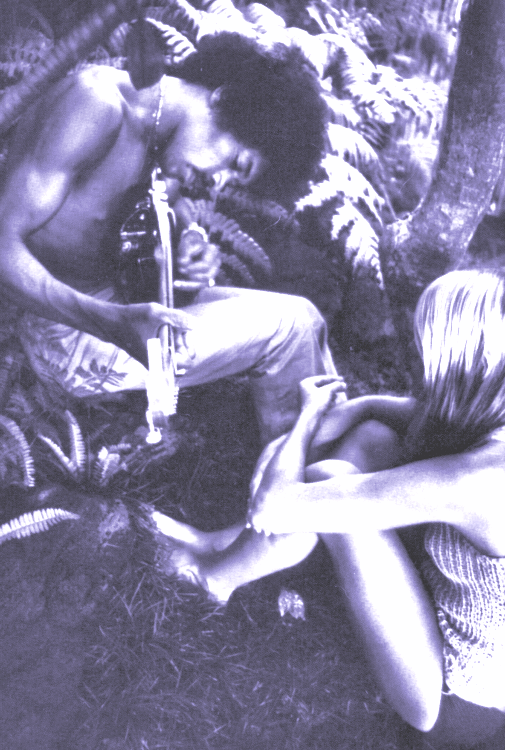 |
  |
 |
published: August 28, "2005"
Dominator Blues |
|

What's New & Previews
Jimi's Prediction —
A Remote View About Jimi Hendrix Timeline Blog Asteroid Impact Evolution Woodstock Blues Jimi Code VS. Da Vinci Code Credit Thefts Missile Agency/Moon Base Charade Remote View Mutation Seattleland Censorship Events Skewed Science Search Engine Rankings Download An Ad AT&T: New Nuremberg Wall(y)flower Syndrome Rochester Media DVD/CD Store More Links...  Page 3 of 7
MCA 1994: One day in Rochester I asked Son's opinion of Jimi. "Yeah, he's alright!" was his decree.
PBS 2003: Son House: "Young people today take anything and make the blues out of it, say, 'such and such is blues.' No it's not! There ain't but one kind of blues, and that consists between male and female that's in love."
RP 1999: The content of the old blues was singing about sex, problems with their old ladies, and booze.
PBS 2003: Son House was interesting because Son descended from a preaching clan, and that's one of his tunes: "Well I'll do religion, and I know I'm religious." But then [he'll say], "all that corn liquor just tastes so good, and that girls' behind is just so good looking - gulp, gulp, gulp! I believe I'm gonna go over here [girls and booze]!" And then he'd get over there and he'd start feeling remorseful about it. The whole thing was like that song he used to sing, "I'm gonna get me religion, I believe I'm gonna join the Baptist church, so I can be a Baptist preacher, and I will not have to work."
RP 1999: Biblical influence over our thinking in the West imposes a duality between body and mind. World religions consider the physical body and the spiritual mind as polarized realms, separate and opposed. This notion of duality was developed in ancient Greece. The Greek philosophers were into dualism and Christianity rapidly came under their spell. That dualism had two strands; one of which was saying that the body wasn't quite as important as the soul, so you get bits in Greek philosophy, like the body is the cloak, the garment, the clothes that the soul wears, and the soul is the real person. But then the body goes from secondary importance to really something that's bad: it's part of the material world, and there is a whole strain of Greek religion, the object of which is to rise above the material world, which is the arena of evil.
RP 1999: The notion that the body is less important than the soul sets the stage for the Bible's tradition against sex. Spirit and flesh were written about as being different from each other. The human body-mind thinks of itself as being split in two, a view of life that is dual - spirit and flesh duel like swordsmen against each other. This philosophical battle has shaped all Western attitudes: sex and flesh are covered in shame, secrecy, guilt and rejection. Spirit, on the other hand, solemn in its sacred humorlessness, is exalted. Spirit is the language of God. Sex is the tongue of the Devil. This split between body and mind attained lasting impact when the authors of the Bible enshrined dualism in scripture.
RP 1999: According to the Bible, the desires of the flesh and the urges of nature must be resisted. Physical cravings are to be suppressed because flesh is the enemy of heaven, sexual members are prone to be seized with involuntary pumping convulsions, chaotic erotic expressions of possession by wild demonic selfishness. In other words, orgasm = disobedience. Codified in these beliefs of Western societies is this struggle to control and pacify earthly urges.
A COLLISION OF MYTHS
RP 1999: But such biblical myths were alien to the African forefathers of rock. Their possession dance rhythms inspire a vision of nature as divinity. To be filled with the rapture implies union of flesh with spirit. Through the trance of dance we can inhabit the deity and be inhabited by the deity. In bodily abandon to the sacred drums, induced by music of hypnotic rhythms, ecstatic dancers become God. The beat of blues, and of rock, originated in such rites. Possession is the message of the music, a message that celebrates sensual feeling.
RP 1999: When African slaves were introduced to Christianity in America, they established their own churches. A doctrine that denied the body, preached by a Voodoo practice that excited the body, would eventually drive the body into fulfilling itself elsewhere. In black churches, the sanctified choirs exhort the congregations into trance-like excitement, led by an impassioned preacher who feels the spirit upon him. The process that the preacher goes through is the same as possession.
PBS 2003: The People who go to church; the same ones you see on Saturday night are the same people you see on Sunday morning when I talk about "Jesus, lift me up!" And Saturday night I say "Baby, lift me up!" I just want to be lift up by my baby, and Sunday morning I want to be lift up by Christ. No different, no different at all. No different in the dance - you dance for Satan, or you dance for Christ.
PBS 2003: SCENES: PEOPLE IN GOSPEL CHURCH IN POSSESSED FRENZY, ECSTATIC ABANDON, SCREAMING.
RP 1999: The worshipper would long for the mind/body unity felt when the church was 'rocking.' The object of the Voodoo ceremony is possession by a god. Possession by the Holy Ghost is as much a formal goal of the religion in Holiness and Pentecostal churches as possession is in Voodoo. Speaking in tongues (in Haiti called "talking with Africa") was evidence to many that the speaker was possessed by the Holy Spirit. Despite biblical prohibitions against the flesh, and in spite of Papal demands for abstinence as the price of salvation, the old ways survived in the black church.
PBS 2003: SCENES: THE SAME PEOPLE IN A NIGHTCLUB PERFORMING ECSTATIC DANCE SEXUAL-ABANDON
PBS 2003: We're doing the Funky Chicken…I'm singing the word out…Making love to that woman every night will be the death of you…I'm not henpecked, I been pecked by the right hen...Look at her [ass shake]…It be talking to me. Not only can it talk, it can sing too…[SCENES: CROWD LAUGHTER AND GIGGLES]
RP 1999: Sex and flesh…snickers and giggles attend their mention.
RP 1999: At the heart of rock 'n' roll is the beat of rhythm 'n' blues. R&B is a slicked-up, citified version of the old rural blues. Before being imported to the American South, the "blues beat" in Africa and the Caribbean was a focal point for native dance rites of possession. Animism is a belief system in which animals and natural objects are thought to possess spirits and souls. African animist beliefs feature intermediary spiritual messengers that act like bridges between man and God. These spirits are called Loas. Loas are the sub-deity messenger-gods invited during Voodoo rituals to possess tribal dancers. Loas are invisible energies that connect us with the ways of nature. The ancestors of rock 'n' roll used hypnotic rhythms from their sacred drums to enter a dance trance and commune with Loas. Being the multiple expressions of God, Loas are invoked to flow through a dancer caught up in physical-spiritual rapture. This fusion between people and deity produces ecstatic effects in the possessed.
.
|
| © 2005 First Century Press. All Rights Reserved. Contact Us |

